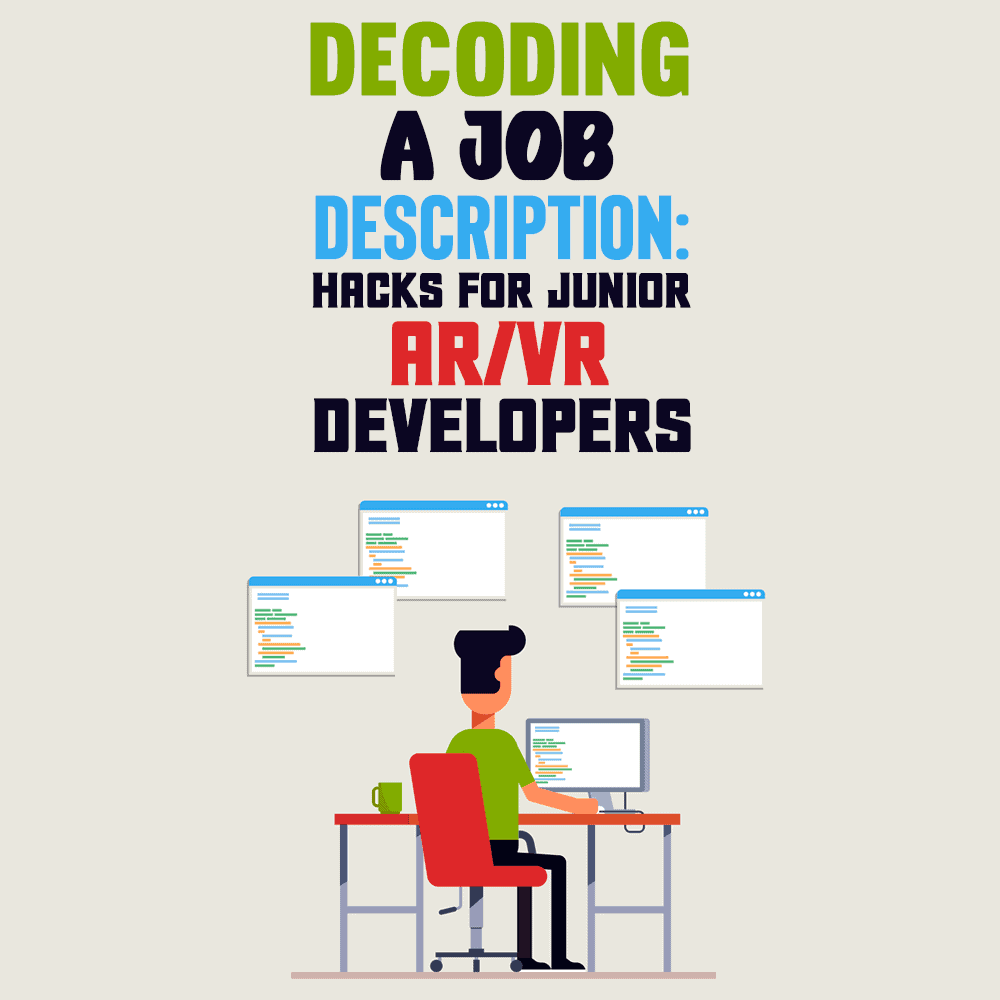
However, the truth about becoming a working augmented reality (AR) or virtual reality (VR) game developer — or any type of game developer, for that matter — is that most studios looking to hire programmers at this moment want experienced professionals with years of experience. Entering the AR/VR gaming industry won't be a walk in the park for junior programmers looking to land their first jobs.
Additionally, immersive gaming job descriptions often utilize clipped or unclear language and industry-specific jargon. Most of the time, they sound discouraging to anyone who doesn't have two to five years of work experience under their belts.
Under these conditions, looking to enter the AR/VR gaming industry can be intimidating. However, this doesn't mean that it's impossible — even if you are a junior developer.
This guide covers the process of decoding job descriptions in the digital entertainment industry. It indicates what junior programmers should look for in job postings, teaches you how to decode commonly used phrases, and provides tips on what extra things you can do to ensure you land your dream job as a game developer.
What Skills Do You Need to Join the AR/VR Gaming Industry?
Successfully landing a job as an AR/VR developer — yes, even as a junior — depends on whether or not you have the relevant skills.
So, it's no surprise that the first step towards getting hired in the digital entertainment industry should start with a period of in-depth research. Specifically, research during which you will identify the hard and soft skills required by the employers hiring in the industry you wish to join.
The ideal way to do this will, of course, be to start browsing job postings. Whether you choose LinkedIn, Indeed, or any other platform, the best thing you can do is to write down the qualifications employers require, ideally separating them into three categories.
Must-have hard skills
You will find that a career in AR/VR development largely depends on your technical know-how. To land a job as a junior developer, you will have to possess some essential coding skills, although the requirements will differ based on the needs and the size of the organization you're looking to join.
Generally, game development organizations work with C programming languages, specifically C# or C++. The great news for those just getting started with coding is that there are a multitude of resources you can use to learn C programming. For example, C# in Depth by Jon Skeet stands for one of the best resources in the industry, while this introduction to learning C++ on the Simple Programmer blog also provides aspiring developers with helpful information.
But, in addition to having a solid grasp of C programming languages (you need to be proficient even if you're only applying for a junior position), you'll also need to have a strong understanding and some practical experience with the most commonly used game engines.
Nowadays, most game-developing teams — around 70% — work in Unity. This is quite convenient as the company behind the platform offers certification training specifically for game developers. However, note that some big studios, like Epic Games, build their products using Unreal Engine, while others, like Ubisoft, might go with their in-house version of CryEngine.
The best way to show your hard skills off will be to polish your portfolio. Whether you've worked on personal or school projects before, make sure you use them to highlight your knowledge and show how your previous experience could benefit the studio you're looking to join.
However, note that you should limit the number of projects you show off when applying for jobs. A cluttered GitHub profile, for example, won't just distract from your main qualities as a developer, it might also send the message that you lack focus. That is definitely not the impression you want to leave at an interview for a dream job.
Nice-to-have capabilities

For example, developing games isn't just about writing code — it's also about perfecting it. So, aspiring programmers looking to enter the industry should be prepared to work on profiling, debugging, and user interface (UI) optimization.
Those applying for entry-level positions might also want to obtain some experience with reporting software, as entering the game development industry via the quality assurance (QA) route makes for a great career path.
Lastly, don't forget that today's consumers use multiple platforms to play games. In fact, while PC or console may seem like the logical solution for playing games, statistical data shows that mobile phones beat both as consumers' top choice in 2021. So, if you've built apps in the past, the experience may prove to be the thing that sets you apart from other candidates and helps you get the position you’re after.
Preferred soft skills
As you embark on your job search journey, don't forget that developing games isn't just about the hard skills. After all, anyone can learn those, as long as they do the work. Creating the next big title is just as much about having the right soft skills.
Next-level game designers aren't just those professionals who know how to write clean lines of code and come up with effective solutions to common problems. Aspiring game developers should also understand the finer details of creating a great entertainment product — from storytelling to visuals and even to finding the voice and sound of each protagonist, all to make the game experience as immersive and realistic as possible.
Furthermore, note that creating games is never a one-person effort. It demands the hard work of a well-oiled team, which means you'll need great communication skills and critical thinking. Also, an agile approach to the creative process will be crucial to achieving success in the field. (On that note, Doing Agile Right: Transformation Without Chaos is a great resource for learning how to make agile work for you.)
Lastly, if your goal is to graduate from a junior to a mid-level or senior position, understand that your career path will require you to become comfortable in a leadership role.
In addition to your technical know-how, make sure you work on perfecting your project management and leadership skills. And, if you have any previous experience in the type of role you see yourself performing in the (near or far) future, make sure you highlight it during your interview.
Do I Need a Degree in Computer Science or Engineering?
One common question a lot of junior AR/VR developers looking to enter the industry ask is whether they need a degree in computer science or engineering.
The truth is, most job descriptions ask for one of these. Nonetheless, a closer look reveals that game development studios are prepared to work with programmers who don't have formal education.
Still, those applying for jobs without a degree will have to show approximately three years of experience in relevant fields. Alternatively, they will have to prove that they possess the technical knowledge required for the position in question.
Remember, the AR/VR field is still relatively young. This means that companies will be ready to take on gifted developers who don't necessarily meet all their requirements.
Regardless, the best way to ensure you stand out when applying for jobs as a game developer is to look for any opportunity you can get to build your skills and widen your horizons. Whether this means joining school clubs, attending hackathons, working on passion projects, or being active in relevant Discord communities is entirely up to you.
Understanding Job Descriptions in the AR/VR Gaming Industry
As you look for opportunities to enter the AR/VR game development field, you might find yourself confused by clipped and repetitive wording used in job descriptions. Understanding the meaning behind these descriptions during your job hunt will be crucial.
First of all, having a clear idea of the meaning of these phrases will help you optimize your job application so that you stand out in a sea of candidates. Secondly (and perhaps much more importantly), it will help you decide whether the organization in question is the right fit for you and whether the company culture will give you the opportunities you seek as a programmer.
So, let's look into some of the most common words and phrases utilized in job descriptions advertising for junior AR/VR developers and find out what they truly mean:
“Must be able to multitask/prioritize/work in a dynamic environment”
Essentially, this means that the role you're considering taking on comes with a heavy workload. If you're up for this kind of challenge, such a position will be ideal for you. However, if you need time and space to perfect your skills and workflow, perhaps you should look for job postings that mention keywords like stable or supportive environment in the description.
“Ability to work under pressure”
This position will involve large amounts of pressure. That can be great for those who thrive on excitement, deadlines, and making do with challenging constraints. However, if having too many things outside of your control stresses you out, this phrase is a dead giveaway for the exact type of position you should avoid.
“Have a willingness to grow and develop”

“Independent/self-motivated”
While it may appear like this phrase means you'll have autonomy, it's usually a signal of the company leadership not having enough time to bother with training new hires. So, if you really are independent, don't mind learning on your own time, and love coming up with new solutions, this will be an excellent job for you. However, if you prefer a little guidance, perhaps you should strive to apply to an organization with a strong mentorship culture.
Kicking off Your Job Hunt as a Junior AR/VR Developer
Whether you've already started applying for AR/VR developer jobs in the gaming industry or are just doing research, remember that the best way to ensure your personal job satisfaction is to join an organization whose values match your own.
In other words, make sure you have your priorities straight.
If you want an opportunity to grow and do work you're proud of, you might consider joining a startup studio where the pace will be fast and the challenges you encounter will push you to your limits. However, if stability, work-life balance, and healthy company culture are what you want, then you might do better joining a team where you'll get training and guidance, albeit at a slower pace.
Either way, don't be afraid to ask questions when you go in for interviews. After all, it's not just you who's being evaluated. If your career is to bring you satisfaction, your employer will have to bring just as much to the table as they expect from you.
